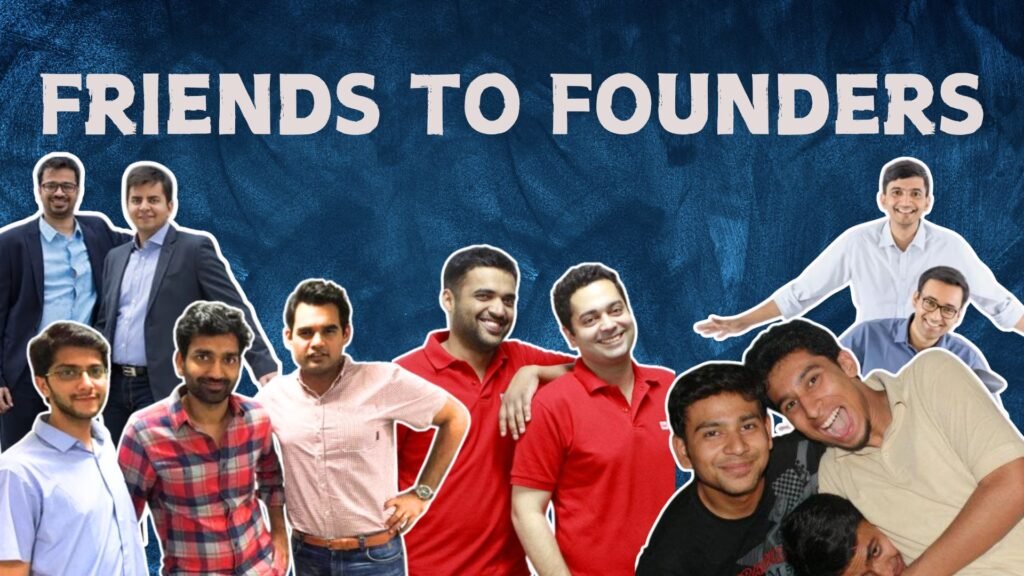In a bustling flat in Bengaluru in 2007, two former Amazon employees sat huddled over a laptop, trying to fix bugs on their website. They were not just colleagues or co-founders. They were friends.
That startup, Flipkart, would go on to redefine e-commerce in India, culminating in one of the largest technology acquisitions the country has seen. Its co-founders, Sachin Bansal and Binny Bansal, shared more than just a last name. They shared conviction—and trust.
Friendship, it turns out, may be one of the most underrated factors in India’s startup boom.
As the country witnesses a generational shift in entrepreneurship, many of its most successful ventures—Meesho, Zepto, PhysicsWallah, Ola, Snapdeal, and Zomato among them—can trace their origins not to boardrooms or B-schools, but to dorm rooms, childhood classrooms, and WhatsApp chats.
From Roommates to Unicorn Builders
In 2015, Vidit Aatrey and Sanjeev Barnwal, college roommates at IIT Delhi, launched Meesho as a platform for homepreneurs to sell through WhatsApp and Facebook. The product was inspired by an observation close to home: relatives in small towns struggling to sell clothing and accessories offline.
“Vidit handled the vision and business; I handled the tech,” Barnwal once said. “But the bond came first—we always knew how to disagree without friction.”
Their startup eventually caught the eye of Facebook (now Meta), becoming its first investment in an Indian company. Today, Meesho empowers over 2.6 million small resellers—many of them women—across India.
The story echoes that of Aadit Palicha and Kaivalya Vohra, school friends from Dubai who dropped out of Stanford to launch Zepto in Mumbai. Sharing a cramped one-bedroom flat, they built a 10-minute grocery delivery system in the midst of the pandemic. “We were too young to second-guess ourselves,” Palicha once said in an interview. “Our friendship gave us that blind trust.”
Zepto went on to become a unicorn before either founder turned 21.
Emotional Capital in a High-Burn World
India’s startup ecosystem, now the third largest globally, often celebrates valuations, investor decks, and product-market fit. But in stories like those of PhysicsWallah—co-founded by the charismatic educator Alakh Pandey and systems strategist Prateek Maheshwari—it’s the emotional capital that stands out.
Pandey started recording YouTube lessons for free. Maheshwari saw the potential to scale it into a full-stack edtech platform. The result? A bootstrapped unicorn in a sector that was bleeding cash elsewhere.
This complementary dynamic has played out repeatedly. Bhavish Aggarwal and Ankit Bhati, both alumni of IIT Bombay, co-founded Ola in 2010 after Bhavish had a frustrating cab experience. While Bhavish fronted the business and investor relations, Ankit quietly built the tech backbone.
Snapdeal’s founders—Kunal Bahl and Rohit Bansal—were childhood friends from Delhi Public School, RK Puram. They returned from the U.S. to launch a coupon platform that later pivoted into full-fledged e-commerce. Despite near-collapse during the Amazon-Flipkart wars, they stayed together, restructured the business, and kept the company alive.
The Co-Founder Chemistry Test
“In business, you’re often told to pick a co-founder like you’d pick a spouse,” said a venture capitalist based in Mumbai. “These duos already had that equation—and many didn’t need to test it in the market. They had tested it in life.”
Indeed, the question of co-founder compatibility is one that has vexed accelerators and angel networks for years. Startups often fail not because the idea is flawed, but because founders fall out.
What binds successful founding duos is not just skill symmetry—it’s the ability to argue without resentment, to delegate without insecurity, and to disagree without disconnecting.
Case in Point: Zomato and Beyond
Zomato’s origins lie in a consulting job. Deepinder Goyal and Pankaj Chaddah were colleagues at Bain & Company, frustrated by the lack of online restaurant menus. They began uploading menus to a site originally called Foodiebay. Within two years, the platform scaled nationally and rebranded as Zomato.
In 2018, Chaddah left the company, but the foundation he helped lay remains one of India’s strongest consumer internet stories. Zomato is now publicly listed, having survived fierce competition, an IPO rollercoaster, and global expansion attempts.
What Startups—and Countries—Are Built On
The enduring friendships behind these startups tell us something essential: India’s digital economy was not built on code alone. It was built on faith, emotional resilience, and relational equity.
In a time when entrepreneurs face burnout, pivot pressures, and macroeconomic uncertainty, the strength of the co-founder bond may be as vital as the strength of the idea.
The next Flipkart or Zepto may not come from the next hackathon—it may come from two friends sketching ideas on a whiteboard after class, bound not just by ambition, but by history.



